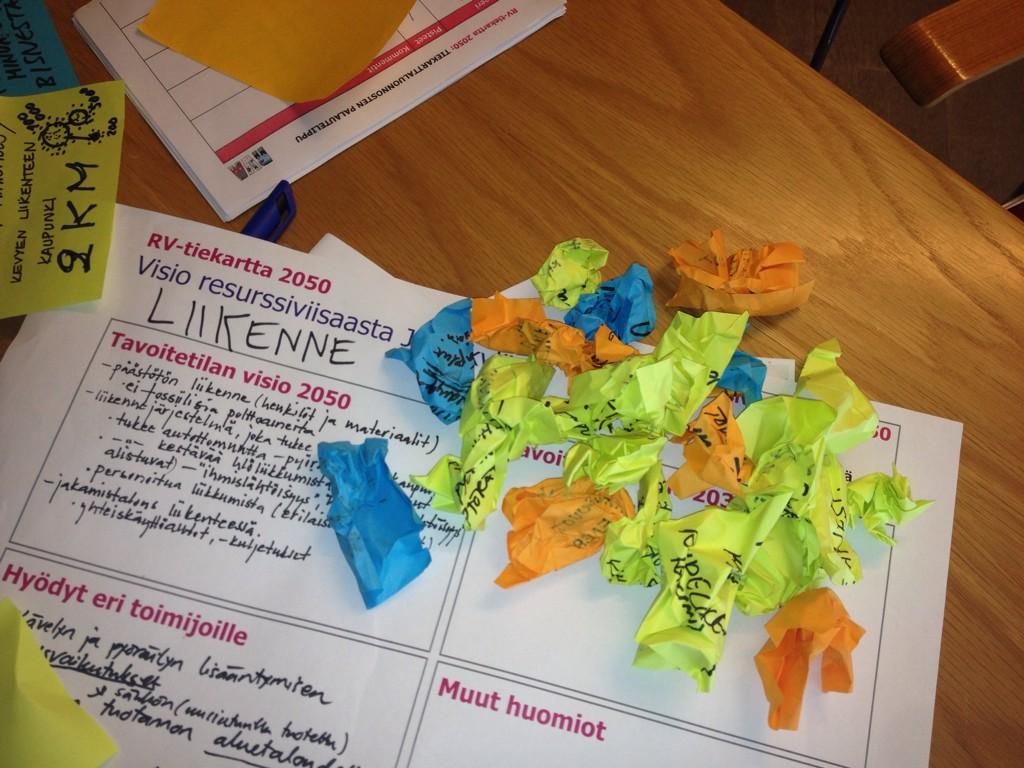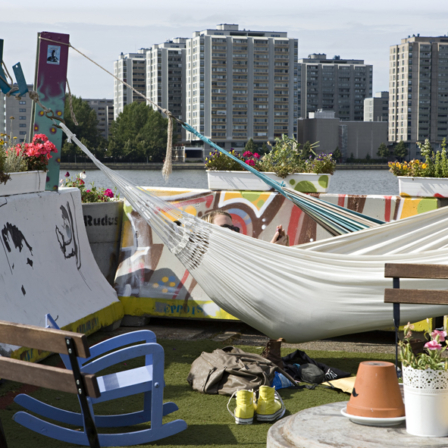The path towards a sustainable city that does not generate waste or emissions is not an easy one, but the people of Jyväskylä have really taken up the challenge. In a two-day workshop, a group of townsfolk with knowledge of resource wisdom created a plan based on which Jyväskylä can achieve this vision – with no effort or nerves spared.
“This is going nowhere! We are not seeing the big picture here…” Litres of coffee is consumed, crumpled post-it notes keep piling up and desperation is mounting in one of the conference rooms at Hotel Alexandra in Jyväskylä.
Thirty local opinion formers have convened here for a two-day workshop organised by Sitra, to draw up a road map towards a sustainable city with zero emissions and waste. Straddling all sectors of society, the workshop is being attended by representatives of the public sector, private firms and NGOs, all of whom have been improving their knowledge of various aspects of resource wisdom over the last 18 months. Now they are setting the bar high: the city will have to be carbon-neutral by 2050 at the latest, not a single bag of waste will be taken to landfills for disposal and residents will have to adjust their lifestyles to fit the one planet living approach – no longer exceeding the Earth’s carrying capacity by consuming natural resources at a rate that would exhaust 3.5 Earths.
These are the facts we will face no matter what – on that we all agree. Recently, a host of international funding agencies have made the connection between climate change and economic trends, and are now analysing the impacts of climate change and depleting natural resources on global development trends,” said Director Mari Pantsar-Kallio of Sitra in her introductory speech on the first day of the workshop.
“Cities that become pioneers in developing solutions for these challenges will be the ones that succeed in the future, and Jyväskylä has what it takes to become one of those cities,” Pantsar-Kallio pointed out, in motivating the workshop participants.
The road map was divided into six paths: the first was for establishing the goals and measures for the energy sector, the second for focusing on the transport sector, the third for future water management scenarios, the fourth for food production and consumption, and the fifth for waste and materials management. The purpose of the sixth path was to envisage what everyday life would be like in the future for the city’s residents. A sustainable communities working group was formed for this purpose.
“The workshop’s main goal is to produce an inspiring and believable vision to which the management of the City of Jyväskylä will be ready to commit,” said the project leader, Leading Specialist Lari Rajantie of Sitra.
On the first day of the workshop, the members of the six groups sketched desired outcomes and milestones for each path, presenting their work at the end of the day to a jury which evaluated what had gone well and what was in need of improvement. Although the feedback was mainly positive, the jury also discerned some needs for further development.
On the second day, planning of the road map needed to focus on the implementation stage – and there was a pile of work to do. The sustainable communities group threw away all of its previous work. At “five minutes to midnight”, it needed to start again from scratch. The jury was due to arrive in 30 minutes, so the jam doughnuts had to wait. The transport group was also a hive of activity, but the amount of waste paper showed no signs of reducing; quite the opposite: a huge pile of crumpled or scored-out paper slips lay on the table. Surprisingly, laughter rang out from the water management group.
“How much food did you say that each Finnish person discards per year, on average? If you multiply that by the population of Jyväskylä, assuming that the amount of food waste were to reduce by 75 per cent by 2030 this would put around eight million more euros in the pockets of local residents! That would have a huge impact on the regional economy…” pondered the mother of the leftover lunch idea, Service Manager Paula Puikkonen in the group focusing on food production and consumption.
The jury arrived at 3 o’clock: the City of Jyväskylä’s Deputy Mayor Timo Koivisto and Director of Communications Helinä Mäenpää, Mayor of Saarijärvi Timo Rusanen, Development Manager Janne Salmi of the INKA programme (bioeconomy), Director of Development for the Central Finland region Hannu Korhonen, and the chairman of the Entrepreneurs of Jyväskylä Petri Salminen. “It smells like you have been hard at work here,” one of the jury members commented.
The efforts of the energy group were presented by Janne Pirttimäki of the Jyväskylän Energia power company:
“The goal is that the city will only use renewable energy derived from wood, wind and solar power, and all waste heat generated by industry will be recovered for further use. Not long from now, prefabricated house factories may begin piloting, ready to use solar and wind power solutions for buildings. Only net energy positive buildings will be built in the city’s new residential areas and technology such as electric cars will form part of the dispersed energy storage solution…”
Each group got to present their work to the jury. The topics included food recycling hubs, bio power plants, carsharing, electric bikes, storm water systems for apartment blocks, new business opportunities and ending oil-dependence. Everyone talked about materials and building a new circular economy, but without using the word “waste”. The nervousness and hype were gone and the groups’ proposals were full of vision and clarity – and despite all the calls for technological innovations, the building blocks for the future are based on existing solutions.
The jury members kept nodding: the groups’ presentations improved from the previous day, the goals for the future were clarified, and a range of measures planned for each of the paths. The end result was a road map towards 2050, according to which transport and energy production will be carbon-neutral and food production based on the one planet living approach will foster well-being, health and economic growth. Water management business activities will be a significant source of income and an export good. Waste management will have been transformed into materials management, promoting the sustainable consumption of virgin raw materials and maximising the use of recycled materials.
“The presentations were to the point, with first-rate goals and plenty of new prospects. I was particularly delighted to hear about the business opportunities and additional jobs provided by resource wisdom,” commented Deputy Mayor Timo Koivisto.
The City of Jyväskylä’s Director of Communications, Helinä Mäenpää, agreed with Koivisto that further development of the road map and its materials must begin without delay, and should be embedded in Jyväskylä’s strategy.
“I was overwhelmed by how convincing the visions were – but I must admit that the bar was set very high. No other Finnish city has anything like this, which is also unique by international comparison. But I definitely view this as a plausible and desirable future scenario for Jyväskylä,” said Mäenpää.
The next step is to submit the road map for more detailed calculations and impact assessments by experts, followed by revisions where appropriate. The completed road map will be published on Sitra’s website and handed over for use by the City of Jyväskylä, with no strings attached.


Recommended